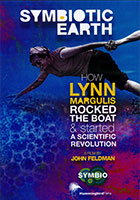
Symbiotic Earth: How Lynn Margulis Rocked the Boat & Started a Scientific Revolution 2018
Distributed by Bullfrog Films, PO Box 149, Oley, PA 19547; 800-543-FROG (3764)
Produced by Hummingbird Films (Susan Davies, James MacAllister, Regge
Life)
Directed by John Feldman
DVD, color, 147 min.
High School - General Adult
Biology, Evolution, Genetics
Date Entered: 05/29/2018
Reviewed by Jim Hobbs, Online Service Coordinator, Monroe Library, Loyola University, New Orleans, LAThe ideas of the late biologist Lynn Margulis are groundbreaking, even breathtaking in their boldness. As the filmmaker says at the outset: "This is a film about the natural world, and a film about a scientist, Lynn Margulis. Feisty, rebellious, and brilliant, she tirelessly challenged conventional theories and ushered in a scientific revolution for the 21st century, turning upside down our ideas about evolution, the environment and life itself."
The film has an introduction, ten sections, and an epilogue. It's not told chronologically but thematically, introducing her ideas and impact. Though not primarily biographical, there are frequent photos and clips of Margulis throughout her career to her death in 2011. Her students, colleagues, and others associated with or influenced by her talk glowingly about her ideas, but there are no contradicting voices. Margulis had many controversial ideas, some of which have proven correct. She saw symbiosis as the driver of evolutionary change, and life on earth regulating its own environment (the Gaia hypothesis). She opposed exploitative, mechanistic, deterministic, reductionist, and fragmented worldviews. To her life is a system, not an unconnected mishmash of microbes, plants and animals. As she said, "We must reevaluate our entrenched ideas and preconceived notions." Revolution is a strong word, but that is what many commentators say Dr. Margulis started in multiple areas of biology, from evolution to genetics to microbiology to ecology, taking broader and more comprehensive views of organisms and their interactions. We see a wide variety of organisms from microbes to lichen to humans and locales rich with life. The film clocks in at a longish two and a half hours. The director appears in passages that don't directly advance the story. For example, Section 1 is entitled "How Lynn Margulis Coerced Me Into Making This Film." However, this weakness does little to obscure the purpose and wonder of the film, ending with Margulis reciting from memory Emily Dickinson's "What mystery pervades a well!"